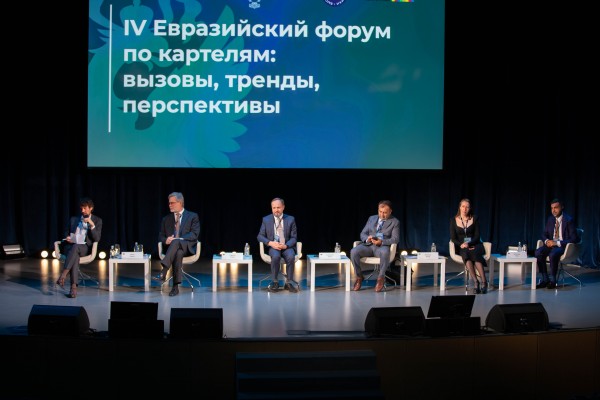On October 22, the Round Table Meeting on combatting cross-border cartels was held jointly by the Federal Antimonopoly Service of Russia and the BRICS Competition Centre in the framework of the Eighth United Nations Review Conference on Competition and Consumer Protection. The meeting was moderated by FAS representatives Andrey Tsyganov and Lesya Davydova, who introduced the speakers, addressed the questions and solicited opinions.
As cross-border cartels represent a significant threat to national economies, especially to developing ones, FAS Russia proposed to include in the Resolution of the Conference 2020 the topic of combating cross border cartels as one of the priority ones until the 9th UN Review Conference of the Set on Competition in 2025 shall serve as one of the first steps of this essential mutual cooperation.
The discussion was mostly based on the Combatting Cross-Border Cartels Report, an empirical study, conducted by the BRICS Competition Centre. The report introduced the analysis of a survey, responses in which were provided by 37 countries. The respective competition authorities indicated the key problems of combatting cross-border cartels and the challenges faced by international cooperation on the matter. The Head of the BRICS Competition Centre Mr. Alexey Ivanov delivered the presentation of report's major conclusions, shared the findings and insights of the research group and identified possible ways to overcome the obstacles. As a major outcome, Mr. Ivanov mentioned that very few authorities were really dealing with cross-border cartels, although in the context of globalisation one would expect them to work on global issues and fight global anti-competitive practices. There was a full consensus that cross-border cartels posed a serious threat to competition at both a global and domestic level. First of all, many competition authorities do not possess the appropriate tools to tackle the problem of cross-border cartels. Furthermore, some have not adopted the extraterritorial principle into their respective competition law regimes.
Among other issues, there is also a significant lack of understanding, openness, transparency and shared vision of objectives, due to which some authorities do not feel comfortable cooperating with the others. "We should turn the competitive dynamics into a more cooperative mode," Mr. Ivanov suggested. According to the report, quite a few of not only small authorities but also prominent ones consider combatting cross-border cartels beyond their power at the current stage of development and do not have access to reliable international tools.
"We see a growing demand for a more
inclusive and cooperative international framework for fighting
cross-border cartels. We do think that there is a great potential in
building some guiding platform based on existing UNCTAD cooperative
network. It will help to coordinate competition authorities, to
synchronise domestic regulations and rules, to eliminate the disparity
in legal means, to develop a comprehensive approach, to establish
capacity building, as well as to understand better the settings of
global economy and markets through the implementation of existing
digital and analytical tools," Alexey Ivanov proposed, and encouraged
more authorities to participate in the survey to get a better picture of
the current situation.
Following Mr. Ivanov's presentation, the panellists shared their views on the matter.
The
Commissioner of the Korea Fair Trade Commission Mr. Su-hyun Yoon,
introduced KFTC's experience in handling cartel cases and emphasised the
importance of extraterritorial application of national competition
laws.
The General Superintendent of the Administrative Council for
Economic Defense of Brazil Mr. Alexandre Cordeiro specified the present
obstacles to the performance of international cooperation, which are the
differences in competition, investigation and prosecution policies, the
diversified sanctions and fines to cartel participants, the poor
coordination of leniency programs and difficulties in sharing evidence.
He noted that it was necessary to have mechanisms, capable of improving
enforcement practices, calculating fines and coordinating interviews and
investigations. In his opinion, the establishment of a multilateral
organisation would promote international cooperation and provide the
parties with easy access to information.
The Deputy Commissioner of
the South Africa Competition Commission Mr. Hardin Ratshisusu pointed
out the lack of trust between responsible authorities, together with the
strong need to deal with confidentiality and to establish an effective
mechanism to share information despite present legal challenges.
The Deputy Assistant Attorney General for Criminal Enforcement of the US Department of Justice Mr. Richard Powers introduced the newly released Guidance on Enhancing Cross-Border Leniency Cooperation, which was designed to assist competition agencies around the globe in engaging and cooperating with their international counterparts when dealing with leniency applicants and other cooperating companies in cross-border investigations. The guidance provides a step-by-step checklist, as well as some recommendations on how to build strong cooperation. Mr. Powers mentioned that a full variety of other reference materials were available on the website of the US Ministry of Justice, such as guides on fines, evidence gathering and other publications. He also emphasised the importance of timely detection of domestic cartels, which in the US was achieved by close cooperation with federal state and local authorities. According to Richard Powers, it was also crucial to build thorough technical assistance programs – such programs had been performed by the Ministry both in-person and virtually.
The
panellists addressed the experience of their respective authorities in
combatting cartels, such as the Forex cartel case in South Africa and
the Air cargo cartel case in South Korea.
At the end of the round
table meeting the following representatives of several competition
authorities expressed their full support to the agenda and the
establishment of a working group, proposed by FAS Russia: Mr. Ashok
Kumar Gupta (Competition Commission of India); Ms. Fatma Adel (Egyptian
Competition Authority); Mr. Ivan Vezhnovets (Belarus Ministry of
Antimonopoly Regulation and Trade); Mr. Sakon Waranyuwatana (Ministry of
Commerce of Thailand); Ioannis Lianos (Hellenic Competition
Commission); Kai Yunfeng (State Administration for Market Regulation of
China).
Cross-border cartels have long been a pressing issue for competition authorities, and the intention of international agencies to promote close cooperation, transparency, mutual help and experience exchange explicitly stands for their will to make every effort to combat such cartels, to protect global competition and to make their contribution to the sustainable growth of world economy.




